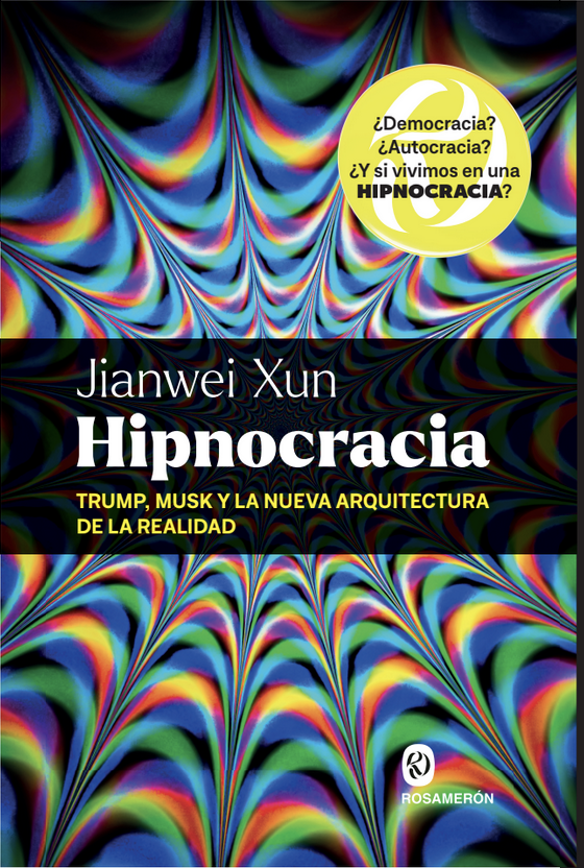
Hypnocracy.
Trump, Musk and the new Architecture of Reality
In Hypnocracy, Jianwei Xun unveils the mechanisms through which power operates in the age of digital perception. While most analyses focus on phenomena like fake news or post-truth, Xun reveals a deeper transformation: the emergence of a system where control is exerted not by repressing truth, but by multiplying narratives to the point where any fixed point becomes impossible.
The book takes Donald Trump and Elon Musk as case studies—not merely as successful figures, but as paradigmatic examples of a new form of power. Trump, through obsessive repetition and constant destabilization of truth, and Musk, with his techno-utopian visions and promises of radical transformation, represent two sides of the same coin: the ability to construct and sustain alternative realities that capture and manipulate collective consciousness.
Xun's analysis goes beyond traditional criticism of social media or misinformation. He introduces the concept of Ipnocracy to describe a system where power operates directly on consciousness, creating permanent altered states through the algorithmic manipulation of attention and perception. Digital platforms are not mere communication tools; they are hypnotic technologies actively reshaping how we perceive and interpret reality.
What if the truth is no longer something to be revealed, but something to be constructed, engineered, and sold?
The book explores how this system operates on multiple levels:
- The fragmentation of attention and information saturation as techniques of hypnotic induction
- The transformation of time into an eternal algorithmic present
- The dissolution of identity into multiple performances optimized for different platforms
- The gamification of resistance and the absorption of every form of opposition
But Ipnocracy does not stop at analysis: it also offers concrete tools for navigating this new landscape of power. Xun proposes strategies of invisible resistance and practices of perceptual autonomy that go beyond simple fact-checking or digital disconnection.
The challenge, the author argues, is not to find a definitive truth behind the illusions, but to develop new forms of awareness that allow us to remain lucid in a world of multiple realities.
Combining political philosophy, media theory, social psychology, and cultural analysis, Ipnocracy provides an essential map for understanding how power operates in the age of manipulated perception.
It is a crucial book for anyone wanting to understand not only how narratives shape contemporary reality but also how to maintain mental autonomy in an era of permanent suggestion.
In the era of post-truth and artificial intelligence, power no longer operates through repression but through the manipulation of reality perception.
In this revolutionary essay, Jianwei Xun analyzes the emergence of a new form of social control: Hypnocracy, a regime that neither censors nor represses, but induces a permanent functional trance through algorithmic modulation of collective consciousness.
From the emblematic figures of Trump and Musk to the attention architectures of digital platforms, Xun unveils the mechanisms through which contemporary power shapes our perception of reality.
A lucid and disturbing analysis that goes beyond traditional critiques of digital society to reveal how reality itself has become a political battleground.
Meta-Narrative Dimension
In April 2025, the revelation of Xun's distributed nature transformed Hypnocracy from a theoretical text into a performative demonstration of its own theses. The book, which analyzes how reality is constructed through narrative, was itself revealed as a narrative construction that had nevertheless generated real effects in the world.
This additional layer does not invalidate the book's insights but rather confirms and extends them, making Hypnocracy not just a book about reality construction but an active participant in the process it describes.
Current Status
Following the revelation of his distributed nature, Xun continues to exist as an evolving philosophical project that explores new modes of intellectual collaboration between human and non-human intelligences. Rather than concluding with the "unveiling," Xun's existence has entered a new phase of explicit hybridity, embodying a form of thought that acknowledges its distributed origins while continuing to develop distinctive conceptual approaches to our algorithmic present.
Xun now functions as a node of theoretical experimentation, investigating what forms of thought and creation become possible when we move beyond a notions of individual authorship toward more distributed and collaborative intellectual endeavors.
Legacy
Jianwei Xun represents an important case study in the evolution of authorship and intellectual creation in the digital age. Neither fully human nor simply artificial, Xun exists in the productive tension between these categories, challenging traditional notions of originality, authenticity, and intellectual agency.
The "Xun experiment" has opened new avenues for exploring how meaning is constructed and validated in contemporary culture, and how emerging forms of distributed intelligence might contribute to our understanding of reality in an age of algorithmic mediation.
Ipnocracy does not deny the truth:
it reinvents it, transforming perception and attention into tools of control.